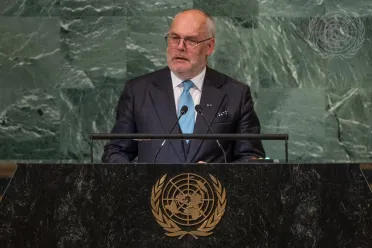Statement
Statement summary
ALAR KARIS, President of Estonia, supporting the goals of the Secretary General’s Our Common Agenda report for the next 25 years of global cooperation, said that it is a herculean task as the international community is witnessing a constant, brutal violation of the United Nations Charter’s principles in every continent, with the Organization itself being transformed in a battlefield. While holding up to the Charter as a reference to advance fundamental rights, he said: “it is not a choice but our collective responsibility (to make sure that) peace, justice and human rights prevail”.
The Russian Federation’s invasion of Ukraine, including the illegal occupation of Crimea, and other land grabs in neighbouring countries demonstrate Moscow’s disrespect for international law and the rules-based order, he said. Defining such unjustified aggression as “the most brutal since the end of World War II”, he stressed that it undermines the security of all members of the international community. While “some colleagues are hesitant to take sides”, and other States see the issue as something between the Russian Federation and Ukraine, he said he sees an aggressor and a victim. The Russian Federation’s war makes finding solutions to other crisis — in Afghanistan, Myanmar, Yemen, Syria, Sahel and the Horn of Africa — more difficult. “I visited Ukraine two months after the invasion began. The site was horrific. I lack words to describe the brutality,” he said, condemning war crimes in the strongest term.
Citing reports by the United Nations Assistant Secretary-General on Human Rights of credible allegations of forced transfers of unaccompanied children to Russian occupied territory, or to the Russian Federation, and pointing to mass graves of tortured civilians, he asked: “I wonder, are we living in the twenty-first century?” He also paid tribute to the immensurate resilience of the people of Ukraine. “Helping Ukraine to protect its right to exist is our collective obligation,” he added, disturbed by the Council’s paralysis in that regard. He called it shameful that since 24 February it has adopted only one statement on Ukraine, whereas the General Assembly has been active and decisive, with its 2 March resolution condemning the Russian Federation’s aggression and urging it to immediately and unconditionally withdraw all its troops from Ukraine. A strong proponent of curbing the absolute veto power in the Council, “even more so when used to cover war crimes and crimes against humanity”, he said notwithstanding the Assembly’s landmark veto-initiative to step in when the Council is unable to act, “the question remains, how can we accept that aggressor has a veto power in the Security Council?”
Noting that 40 per cent of Ukraine’s population needs urgent humanitarian assistance, he said so far Estonia has mobilized €20 million in aid and called on other States to support the country’s reconstruction. The Russian Federation’s war of aggression has also pushed the total number of refugees worldwide to over 100 million. Estonia has welcomed 55,000 refugees from Ukraine, and opened The Freedom School to provide Ukrainian children with education, shaping that country’s future leaders and rebuilders. He also touched on disinformation, which makes it “easy for any aggressor to put forward its false narratives”. Turning to Afghanistan, he praised the women in that country protesting against the Taliban to fight for their rights and called on the de facto leaders to stop harassing Afghan female staff at the United Nations Assistance Mission in Afghanistan (UNAMA).
Stressing the impact of climate change, he cited Estonia’s aids to those severely affected by flooding in Pakistan. The Russian aggression has brought further pain, triggering the global food and energy crises, as well as destroying Ukraine’s grain supplies and burning warehouses, he said, welcoming the Black Sea Grain Initiative. Deeply concerned about the situation at the Zaporizhzhia nuclear power plant, he called for it to be demilitarized without delay, the return of its full control to Ukraine and unhindered access to the facility for IAEA experts. He expressed regret that Moscow “shamelessly blocked” consensus on an outcome document at the Treaty on the Non-Proliferation of Nuclear Weapons Review Conference. He stressed the need to elevate cybersecurity as a key component of the United Nations international peace and security agenda. He supported independent and effective investigations into atrocity crimes, in Ukraine, and other areas like Syria and Ethiopia, to bring those responsible for genocide to trial. Supporting all initiatives fostering accountability, he urged States not to “fall into indifference”, leveraging an opportunity for the Organization to “emerge from this watershed moment more relevant and united than before”.
Full statement
Read the full statement, in PDF format.
Photo

Previous sessions
Access the statements from previous sessions.
